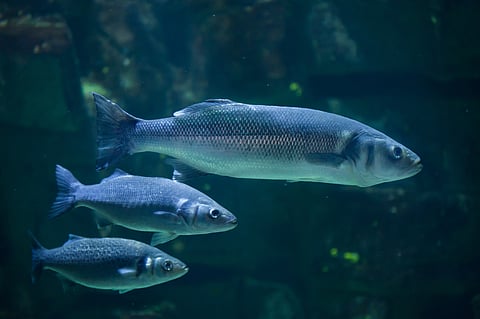

European seabass (Dicentrarchus labrax)
Photo: Adobe Stock
Researchers at the Institut de Ciències del Mar (ICM-CSIC) in Barcelona have reported that brief periods of high temperature during early development can modify the biology of fish - and that some of these changes appear to pass on to the next generation.
The work, published in the scientific journal Epigenetics & Chromatin, examines the European seabass and outlines how rising ocean temperatures may influence commercially important species. European seabass (Dicentrarchus labrax) is one of the most commonly farmed species in the Mediterranean Sea, with Turkey, Greece, Egypt and Spain the main producers.
Through experiments focusing on seabass reared at French marine research institute IFREMER’s facility in Palavas-les-Flots, the research team found that heat exposure altered seabass DNA methylation, a process that can influence gene activity without changing the underlying DNA sequence. Only a small share of these heat-linked effects carried over to offspring, but the scientists say the inherited fraction could influence how fish respond to future conditions - and argue in their paper that the findings could have "important implications for species conservation under global warming."
“We found that certain temperature-induced epigenetic marks in the parents are maintained in their offspring, even if these were never exposed to heat,” said first author Núria Sánchez-Baizán, now based at IFREMER in France, in a ICM-CSIC news release.
“This phenomenon suggests that a temporary environmental change such as a marine heatwave can leave a heritable imprint that is not always beneficial if conditions return to normal, a concept known as an ‘epigenetic trap’,” Sánchez-Baizán noted.
“This is the first time it has been described in such detail how temperature can modify the epigenome of a marine vertebrate and how some of these changes can be inherited,” added senior author Francesc Piferrer of ICM-CSIC. “This helps us better understand how marine species can respond to climate change not only at the genetic level but also epigenetically, while also warning us that these responses can be a double-edged sword.”
The researcher team argues that these findings have practical implications for fisheries management, aquaculture and conservation planning, as epigenetic changes may help species adapt to slow environmental shifts but could also create disadvantages if conditions change again. They add that further work is needed to understand how inherited epigenetic information influences resilience to global warming, suggesting that epigenetics should be considered in future conservation strategies.
